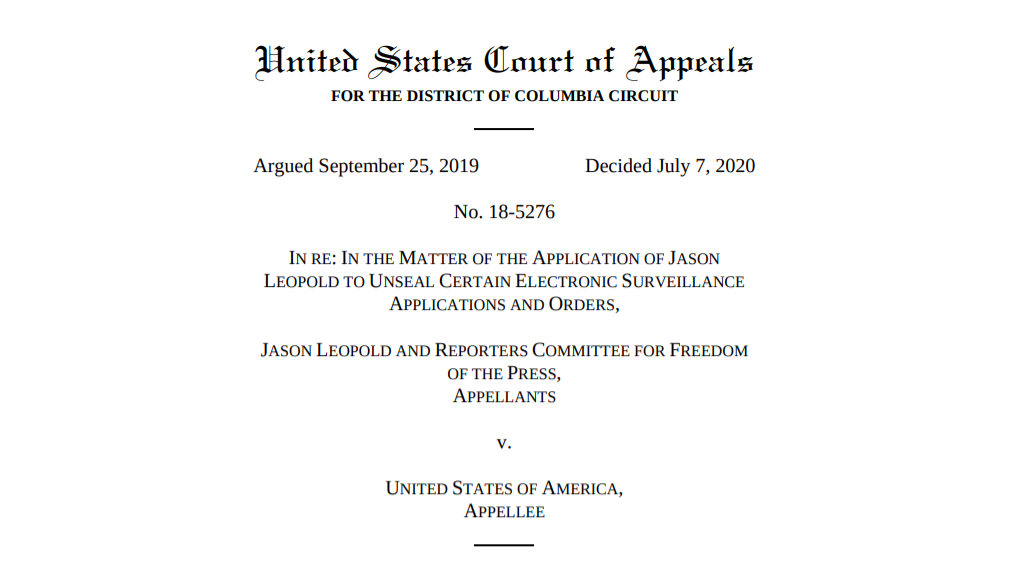DC Circuit reverses district court ruling on unsealing electronic surveillance records

Update: Following remand from the U.S. Court of Appeals for the District of Columbia Circuit, the district court ordered the government on Feb. 9, 2021, to begin unsealing materials in three categories of court records related to requests for judicial authorization to engage in electronic surveillance. The order requires the government to apply redactions for what the Court has deemed “personally identifiable information,” including names of investigative targets, phone numbers and email addresses.
The U.S. Court of Appeals for the District of Columbia Circuit has reversed a district court’s decision that denied public access to certain electronic surveillance records, holding that the “public’s right of access to judicial records is a fundamental element of the rule of law.”
The appeals court ruling is a major win for the public’s right to access court records — and for Reporters Committee attorneys, BuzzFeed News investigative reporter Jason Leopold and his attorney Jeffrey Light, who have fought for years in court to unseal judicial records that will enable the press and the public to monitor the government’s use of surveillance tools.
In its ruling issued on Tuesday, a three-judge panel of the D.C. Circuit considered the public’s right of access to three kinds of court orders authorizing the use of powerful electronic surveillance tools in criminal investigations. These tools allow law enforcement to collect different kinds of electronic information, including metadata about a person’s phone calls or text messages and, in some cases, the contents of emails.
Generally, these records remain sealed even long after the criminal investigations end, which limits the public’s knowledge about why and how often the government obtains communications records using these tools.
The D.C. Circuit held that a district court considering a motion to unseal these types of surveillance records must apply a six-factor balancing test to determine whether continued sealing is appropriate. The Court then held that the district court incorrectly determined that “administrative burden” — in this case, the number of personnel hours it would take to provide public access to these sealed materials — was enough, on its own, to justify ongoing sealing.
“Providing public access to judicial records is the duty and responsibility of the Judicial Branch,” Judge Merrick Garland wrote in the D.C. Circuit’s opinion. “Precluding public access because of the personnel-hours required to produce those records is no more warranted than precluding public access to high-profile trials because of the costs of crowd control.”
Leopold’s quest to unseal electronic surveillance records began in the district court in 2013. Reporters Committee attorneys intervened in the case three years later, helping the journalist and his attorney push for more public access to these court orders and other filings.
After the district court held, among other things, that the administrative burden of providing access to these judicial records overcame the public’s right of access to them, Leopold and the Reporters Committee appealed to the D.C. Circuit in 2019. Preventing access, they argued, “obstructs the public’s ability to observe the conduct of its courts and the executive branch.”
In its ruling, the D.C. Circuit agreed that administrative burden, on its own, could not justify interminable sealing of these records.
“Administrative burden is relevant to how and when a judicial record may be unsealed,” Judge Garland wrote, “but not to whether it may be released at all.”
The D.C. Circuit’s decision sends the case back to the district court for further consideration.
Leopold praised the appeals court’s ruling.
“Transparency is the foundation of our democracy. It’s really crucial that the public has as much information as possible whenever secret orders are being used,” Leopold said. “Too much faith and trust has been put into the government, and this will give the public an opportunity to understand what the government is up to.”
The Reporters Committee regularly files friend-of-the-court briefs and its attorneys represent journalists and news organizations pro bono in court cases that involve First Amendment freedoms, the newsgathering rights of journalists and access to public information. Stay up-to-date on our work by signing up for our monthly newsletter and following us on Twitter or Instagram.